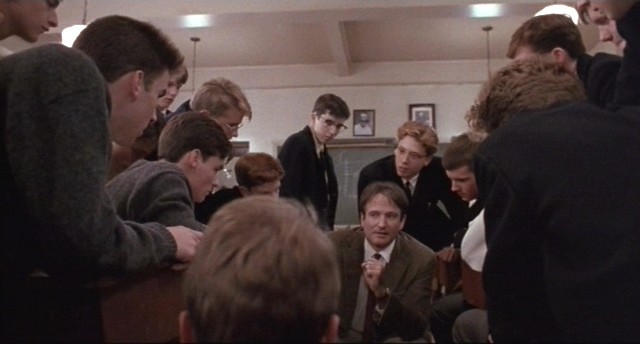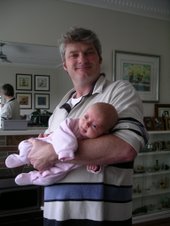
Or "life, death and the confusion in between!"
It has been a very interesting last few weeks dear readers, my apologies for not keeping in touch. Five weeks ago, the mother in law suffered a stroke. Meanwhile, Little Wrightie has been growing - slowly but surely. Last week, I attended the funeral of a mate of mine's father. All fairly normal events in this world; they are the types of things that happen every day, everywhere. I don't seek sympathy, nor do I wish to use these things as an excuse for whatever lack of energy I may have suffered over the last few weeks. These things do however get one thinking.
I am now in danger of committing a rant. I hope you'll bear with me.
The wonders of new life, the sadness of old age and death. The regularity with which it happens. How significant or otherwise are we? Each and every one of us live lives full of our own adventures and dreams and dramas. None are more important than the next person's. Really, they're not are they? Then, one day, guaranteed, we will, each and every one of us, stop breathing, turn cold and die.
I don't necessarily want to sound so morbid, but I couldn't help but think over the last couple of weeks, of the movie "Dead Poets Society". I'm sure most of you will remember it. One scene in particular has always stood out in my memory. It's the scene where the boys meet their new English teacher for the first time. As I describe it, it should come back to you.
John Keating (Robin Williams) an alma mater of Welton College (where the film is set) invites the class to follow him outside the classroom into the corridor which is lined with glass cabinets full of old sporting trophies and black & white photos of the teams that won them. He asks one of the boys to read the first stanza of Robert Herrick's famous poem (it's at the end of this post) in which he advises people to take advantage of life when they are young. It's also here that we hear for the first time in the movie what "carpe diem" means - seize the day. Keating then asks the boys to look more closely at the photographs in the cabinets, at the faces of the boys in the sports teams. Faces the current boys have walked past many times, but never really noticed. He talks about how alike they are to the current boys - they have the same light in their eyes, the same haircuts, the same feelings of invincibility. Dreams and hopes of great things. The difference however, is that the boys in the photos are gone. They are "fertilizing daffodils". Keating uses this exercise to inspire the boys to make their lives extraordinary.
Pretty cool don't you think? The faces in the photos still haunt me.
The bit that struck me the most though, was not the "carpe diem" bit. It was the fact that the current boys had walked by the ghosts of the past without ever, really having given them any thought. The fact that each of those boys in those 60, 70, 80 year old photos were probably talented, bright, perhaps great achievers in their own lives, yet the current generation honestly, didn't particularly care.
In the last couple of months of my Dad's life, while he was still well enough to be at home, he showed me his collection of photographs. It was a small collection to say the least, two old processing envelopes with a rubber band around them. In these envelopes were contained no more than 20 or 30 mostly b & w prints of Dad and a few of his mates in his army and air force days during the 2nd half of WWII. Photos of training in country Victoria, New York harbour as they arrived by boat, the countryside of England close to where he was based with the Lancaster squadron and the White Cliffs of Dover, because he travelled there once and liked it. He was going to throw them out! He didn't think anybody would find them interesting!
How many such modest yet worthy men have come and gone in the history of this planet? How many great achievers have passed by unnoticed? How much talent has there been that has never been fully realised? Unless you're ever famous/infamous enough to have a statue made in your honour, or your photo/story published in a history book, who is going to remember you?
I find it puts the arrogance of some people into perspective a bit.
My mother in law, for all her less than positive character traits, (those of you who know her will know what I mean) was once a teacher. She was always brilliantly minded and a talented musician. Do you think the staff in the hospital looking after her know that? Do they see her as anything other than just another dribbling old woman wearing a nappy? Don't get me wrong, I believe the majority of nurses do a magnificent job and I don't expect them to know each of their patients intimately, but I hope you get the point of what I'm trying to say.
We are born, we live and then we die.
At the funeral the other day, what do the people who run the funeral parlour know about the man they are dealing with. What does the celebrant, hired to lead the service, care about the man he's hearing family and friends talk about? Is it just another day at the office for them?
Again I ask - in the greater scheme of things, how truly significant or otherwise are we?
I'd like to end this on a slightly more "up" note. As Keating points out, we have one shot at it, so we may as well make the most of it. I think it's safe to say that everybody's life, in one way or another, is extraordinary.
A progress report on Little Wrightie coming soon!
To the Virgins, to make much of Time
GATHER ye rosebuds while ye may,
Old Time is still a-flying:
And this same flower that smiles to-day
To-morrow will be dying.
The glorious lamp of heaven, the sun,
The higher he 's a-getting,
The sooner will his race be run,
And nearer he 's to setting.
That age is best which is the first,
When youth and blood are warmer;
But being spent, the worse, and worst
Times still succeed the former.
Then be not coy, but use your time,
And while ye may, go marry:
For having lost but once your prime,
You may for ever tarry.
Robert Herrick. 1591–1674


No comments:
Post a Comment